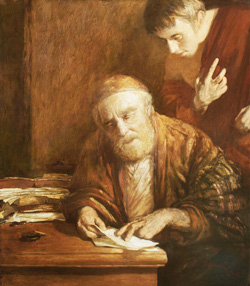He also said to the disciples, “there was a rich man who had a manager, and charges were brought to him that this man was wasting his possession. And he called him and said to him, ‘What is this I hear about you? Turn in the account of your management, for you can no longer be a manager . . .’” Luke 16:1-2
Next day, as he is eating breakfast with his disciples in that same courtyard, the scribes and Pharisees gather under the thatched portico, hoping to have a word with him. As they wait he talks to his followers while passing around bread and olives. The distribution of goods seems to inspire a puzzling little story about a crooked steward who was accused and dismissed by his master. Before surrendering the books, he ingratiated himself with some of his master’s debtors by cutting their obligations in half. Instead of turning the steward over to the law, the master just laughed and said, “I have to hand it to you, my man. You know how to use what you have.”
“So,” the Teacher concludes, “make friends for yourself by means of unrighteous money so that when it fails, those friends may welcome you into their eternal homes.”

Eleazer the Pharisee notices how the disciples, who had been nodding thoughtfully like placid cows all this time while, collectively pause in mid-chew. What . . . What did he just say?
Eleazer’s friend Daniel leans toward him and whispers, “I don’t understand.”
“I don’t either. But I think it might have something to do with us.”
The Teacher is speaking again, and his altered voice signals to Eleazer that he was right about the parable’s true audience. The light, satirical tone was gone; earnest urgency had taken its place. “Faithful in little, faithful in much. If you can’t be trusted with the deceptive things of earth, who will trust you with the truthful things of heaven?”
Revered Benjamin, ruler of the synagogue, makes an audible huff. “What makes him an authority on earthly goods? He mooches off the bounty of women.”
A chuckle passes through the little knot of respectable elders. The Rabbi ignores it but raises his voice half a notch. “What slave has two masters? It’s impossible–he’ll serve one and neglect the other. If money is your master, you can’t serve God.”
That hits home; Eleazer feels it. Revered Benjamin speaks to his circle, but loud enough for everyone to hear: “Envy from a beggar is as rich as from a king.”
“Justify yourself all you want.” With a shock, they realize he is now speaking to them directly. The people may admire your pious exterior but God knows your heart. What men admire repulses him.”
Revered Benjamin’s face hardens to iron; he rears up as though prepared to speak some withering retort (We are Keepers of the law, young man!), but instead he gathers his robes about him and paces majestically away. The others follow, except for Eleazer, who lingers to see how Jesus will respond.
“The law is kept, but not by you,” the renegade Rabbi says quietly, as though speaking to himself. Or, the young student thinks–with a jolt—to me. “The law will always be kept, but it’s no barrier to the kingdom. The lame, the blind, the ignorant, knock it down in their haste to get in, and once in they’ll see it in a new way.
“Are you coming?”
This is addressed to the disciples, who have finished their meal and now begin to gather their things for a walk to the next town. And yet Eleazer knows it is also for him.
Are you coming . . . in?
_________________________________________
For the original post in this series, go here.
Next>
